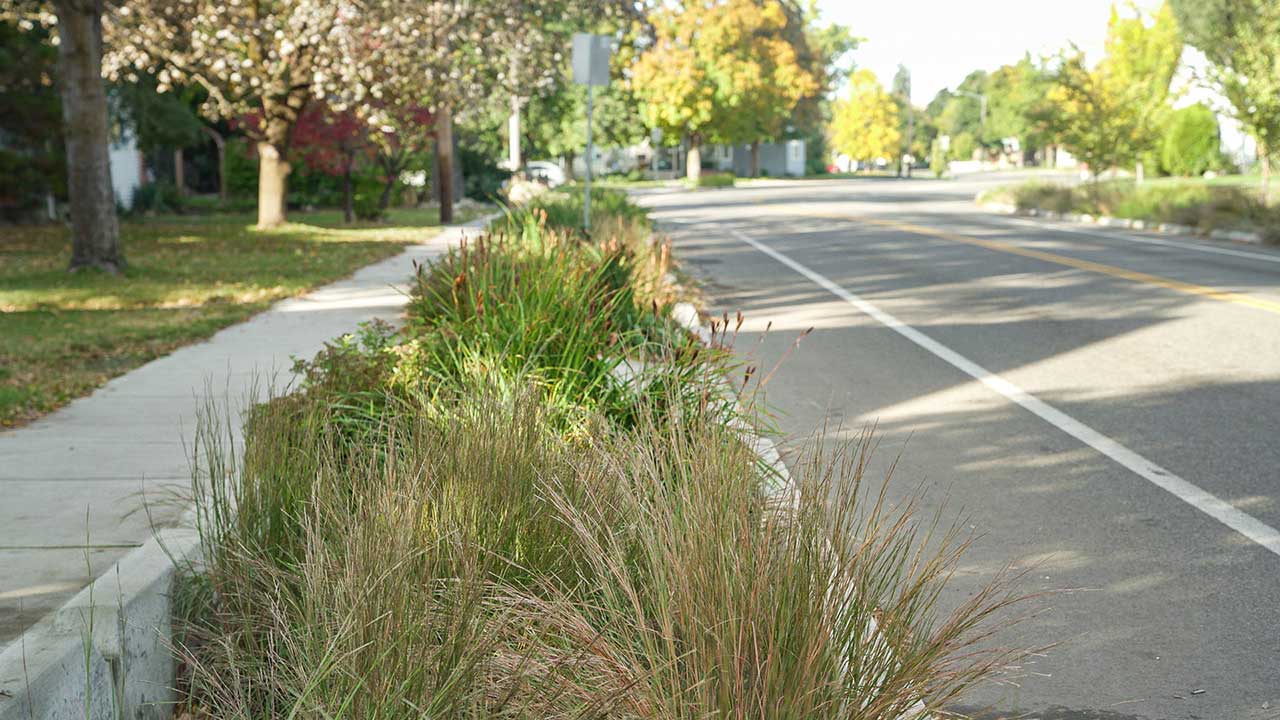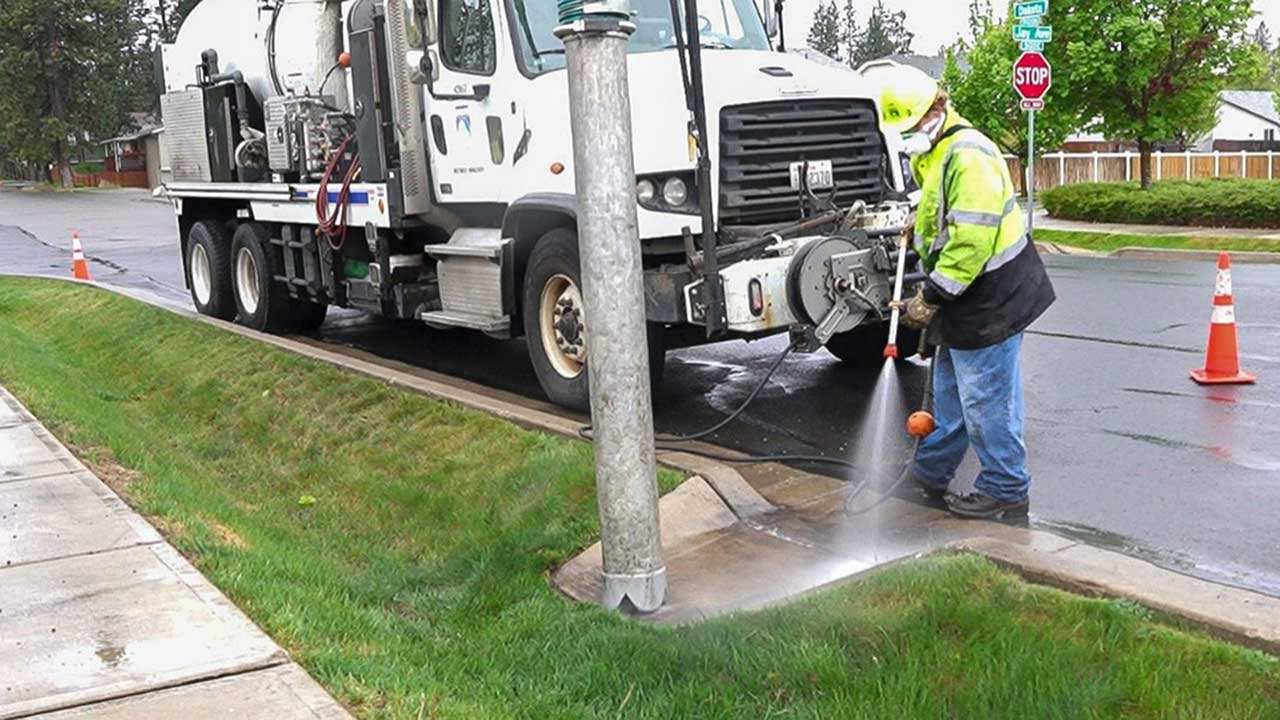Stormwater Best Management Practices
What is a Best Management Practice (BMP)?

Runoff treatment BMPs either provide partial or full treatment. Catch Basins and Drywells provide partial treatment by only removing sediment, and do not remove other pollutants. Catch basins act as pretreatment for other treatment BMPs, such as swales.
Swales provide full treatment for typical urban stormwater pollutants, such as motor oils, landscape chemicals, and illicit discharges that contain toxic chemicals. Swales use the teamwork of natural vegetation and topsoil to filter out sediment and grab oils. The next line of defense is engineered bioretention soil that captures dissolved metals, toxic chemicals, and some nutrients. Finally, microbes in the engineered soil degrade the oils, toxic chemicals and transform heavy metals to treat the polluted stormwater before it re-enters the environment and local waterways. Some swales have overflow drywells that are designed to collect water once it reaches 6 inches deep.
Mandated by state regulations, BMPs are integral during the progression or revitalization of residential, commercial, and industrial properties, serving the purpose of mitigating pollution and effectively managing flooding resulting from stormwater runoff originating from rooftops or paved surfaces.
*Please note in the City of Spokane, property owners are responsible for maintaining swales installed in planting strips adjacent to their property in accordance with Section 17C.200.050 of the Spokane Municipal Code.
What are some types of water quality BMPs?
Rain Garden/Bioretention Areas
Rain gardens, also known as porous landscape detention, are engineered landscaped depressions that provide bioretention of pollutants in stormwater runoff. Bioretention removes pollutants through multiple processes including sedimentation, filtering, adsorption, evapotranspiration, and biological uptake. Bioswales are similar, designed with layers of vegetation and soil, also including a perforated pipe or underdrain in the gravel bed for enhanced stormwater filtration into the soil and drainage system.

How They Work: Stormwater runoff flows into the rain garden or bioretention area, collecting in the garden. Runoff may pool 6 to 12 inches above the mulch, but within 48 hours, it filters through the plant bed. Native plants absorb runoff and nutrients through their roots, while excess runoff soaks through mulch and filter media layers into the gravel bed and underlying soils. This process filters pollutants before releasing stormwater into waterways.
Maintenance: Property owners are responsible for rain garden or bioretention area maintenance.
- Water during dry spells to promote plant growth.
- Prune and weed for appearance.
- Maintain 1 to 3 inches of mulch depth.
- Ensure healthy vegetation, removing dead plants and replanting as necessary.
Grass Swale
Grass swales are shallow, sloped, densely vegetated channels designed to treat stormwater runoff. Grass buffers are vegetated areas around wet basins and wetlands.

How They Work: Vegetation in swales and buffers slows water, enabling sedimentation and pollutant filtering through subsoil.
Maintenance: Property owners are responsible for maintaining swales in accordance with local regulations.
- Keep grass mowed, no shorter than 3 inches.
- Remove litter, debris, leaves, and sediment regularly to prevent clogging.
Stormwater Planters
Structural containers with open bottoms allowing runoff to filter through and infiltrate the ground. Two types: infiltration planters (infiltrate through native soils) and flow-through planters (with impervious liners and overflow pipes).
How They Work: Runoff filters through the planter and infiltrates the ground. Native plants aid in pollutant removal.
Maintenance: Property owners are responsible for stormwater planter maintenance.
- Water during dry spells to support plant growth.
- Prune, weed, and replenish mulch as needed.
- Ensure healthy vegetation by replacing dead plants with appropriate natives.
Permeable Pavement
Permeable pavements replace traditional pavements, allowing stormwater infiltration through pervious surfaces into stone aggregate below.
How It Works: Runoff infiltrates void spaces in the stone aggregate while providing stable surfaces. Commonly used for walkways, parking areas, and patios to treat stormwater and prevent runoff.
Maintenance: Property owners are responsible for pervious pavement maintenance.
- Monitor surface for sediment buildup; remove when necessary.
- Vacuum-sweep pavement or interlocking joints.
- Keep voids clean and free of inhibiting materials.
- Maintain nearby planted areas to prevent soil wash into pavement.
Green Roofs/Facility
Green roofs are vegetative rooftops that reduce energy consumption, stormwater runoff, and pollution. They can extend a roof's lifespan and offset urban heat.
How They Work: Green roofs employ plants to enhance energy efficiency, stormwater management, and urban cooling.
Maintenance: Options range in complexity, but well-maintained green roofs can offer substantial benefits to commercial properties.
What about businesses?
The EnviroCertified Program is a voluntary program offered to local small businesses. The program certifies businesses that put practices and policies in place to properly manage hazardous wastes and conserve resources. The Spokane Regional Health District provides Local Source Control, pollution prevention technical assistance visits. Program administration, public recognition activities and certification visits are conducted by the Spokane River Forum. Find out more about the program.
Thank you, Spokane!
Your participation in implementing and maintaining these water quality BMPs plays a crucial role in enhancing our environment and city resilience. Thank you for your commitment to sustainable practices. Questions? Call 509.625.2900
Contact Information
Wastewater Management
909 E. Sprague Ave
Spokane, WA 99202
Related Links
- Regional Stormwater Manual (PDF 10.1 MB)
- 2019 Stormwater Management Manual for Eastern Washington (SWMMEW) (PDF 24.8 MB)
